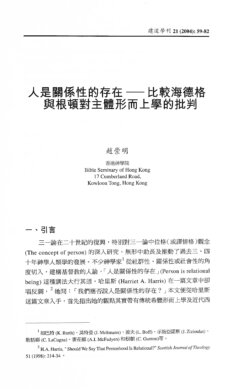人是關係性的存在──比較海德格與根頓對主體形而上學的批判/趙崇明
撮要
當代神學人類學的發展跟三一論在二十世紀的復興有關,因為不少神學家從三一論(特別是社群三一論)中位格的觀念得到靈感,從而開拓了一個從社群性或關係性的角度,由此切入去建構基督教的人論,「人是關係性的存在」這種講法愈來愈受到重視。但哈里斯(Harriet A. Harris)在一篇文章中卻質疑上述這種講法,本文便從她這篇文章入手,首先指出她的觀點其實帶有傳統形而上學及近代西方主體形而上學的影子。跟著筆者便直接討論主體形而上學中的自我同一性及自我觀的問題。針對這些問題,在文章的下半部分,便從三方面(關係性、時間性、自由)比較海德格(Martin Heidegger)及根頓(Colin E. Gunton)的人觀對主體形而上學的批判,從而探究「人是關係性的存在」這句說話可以作何種詮釋,亦由此對這種講法給予正面的肯定。
ABSTRACT
The contemporary development of theological anthropology is related to the renaissance of the doctrine of the Trinity in the 20th century. Many theologians are inspired by the Trinitarian concept of person, from which they establish a doctrine of man from a social and relational perspective. In fact the view “person as relational being” becomes significant in our time. However, Harriet A. Harris rejects this view. This paper thus provides a response to her view as a starting point. The first task is to point out how her view may be affected by the Western metaphysics of subjectivity. The author then argues that the metaphysics of subjectivity would lead to an inappropriate understanding of self-identity and self-concept. In view of these problems, the second part of this paper thus makes a comparison between Martin Heidegger’s Dasein and Colin E. Gunton’s concept of person in order to show how they criticize the problems in different ways. Based on this comparison, it is expected that an appropriate interpretation of the view “person as relational being” can act as an effective way to tackle the problem of subjectivity theologically.
原載於《建道學刊》21期(2004年1月),頁59-82。
最新文章
【代院長的話】神學教育的生命迴響 / 高銘謙
2024 年 10 月 1 日
建道通訊217期
2024 年 10 月 1 日
【屬靈導引】屬靈導引—一門失落的藝術 / 董智敏
2024 年 10 月 1 日
编辑精选
從梧州到長洲:建道神學院125年的挑戰與恩典 / 陳智衡
2023 年 10 月 1 日
微小教會的見證/高銘謙
2023 年 6 月 1 日







